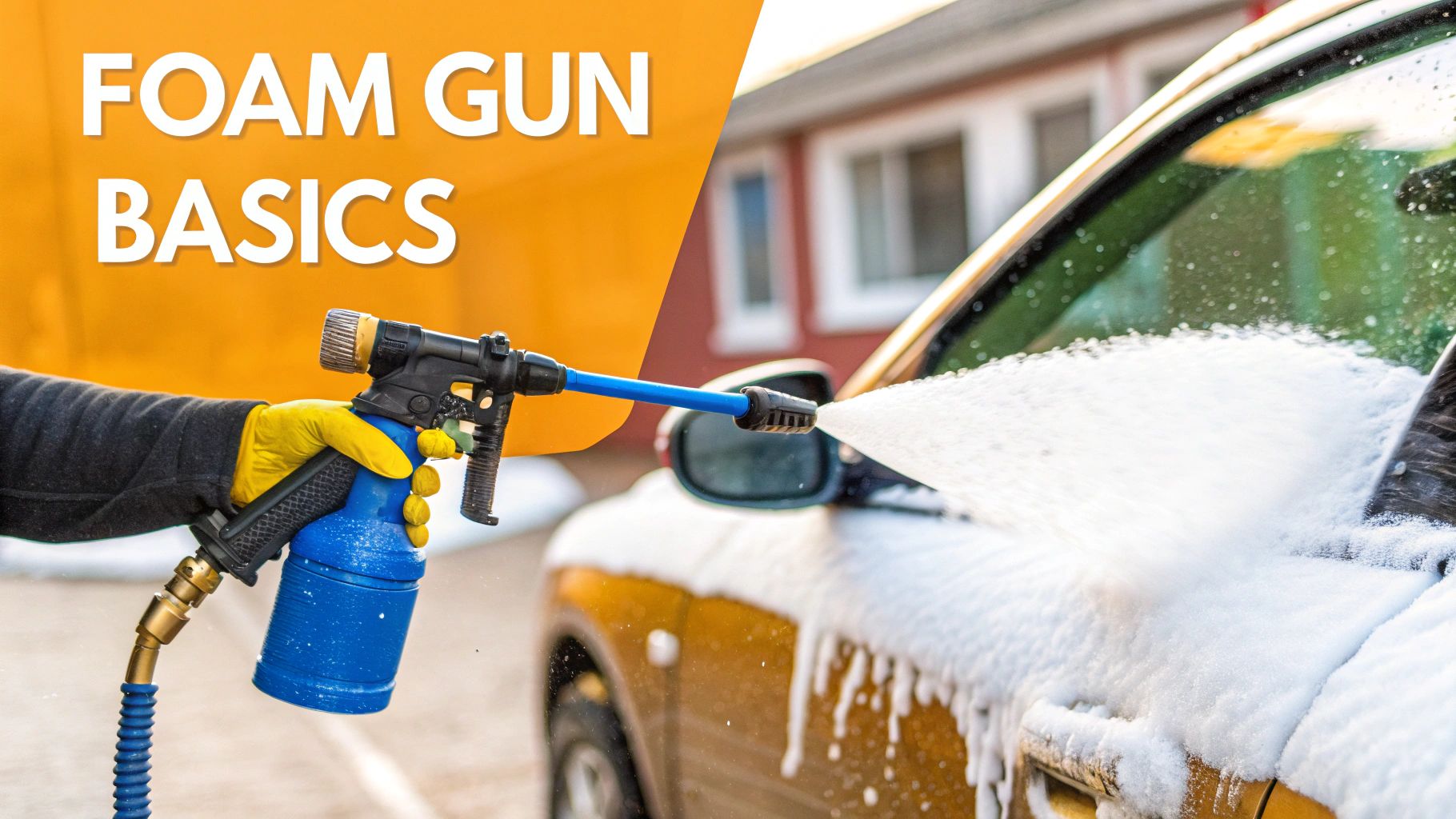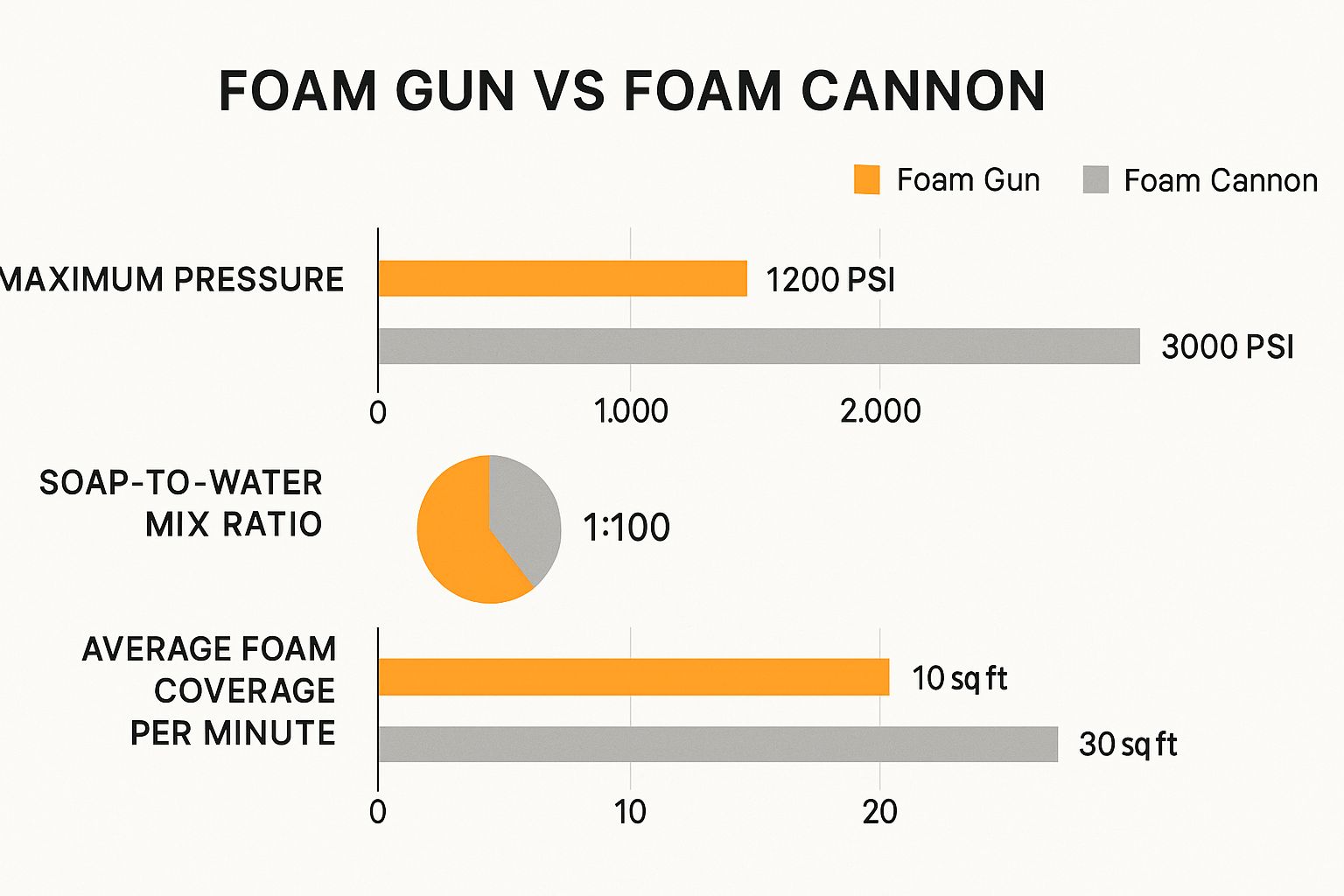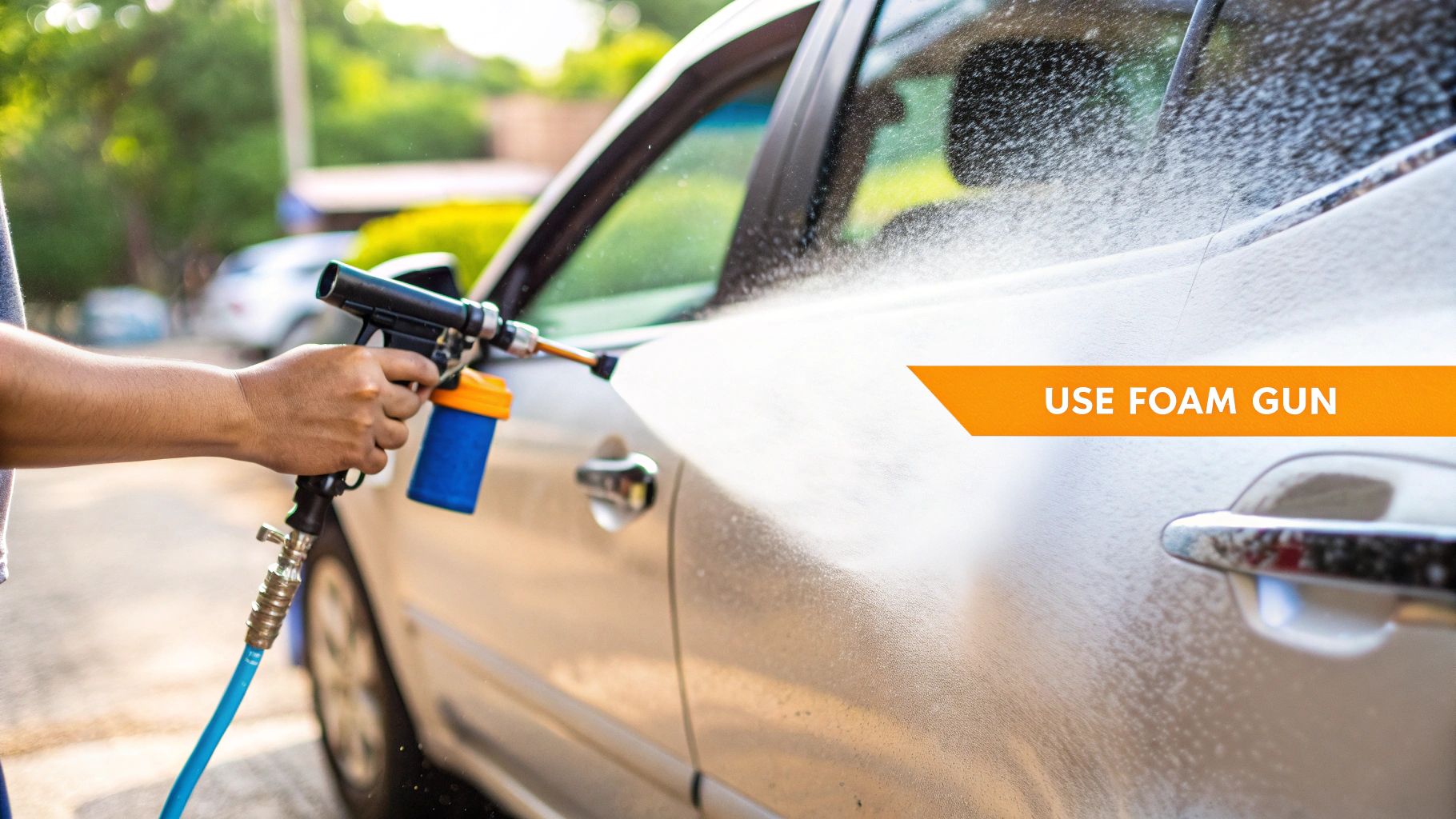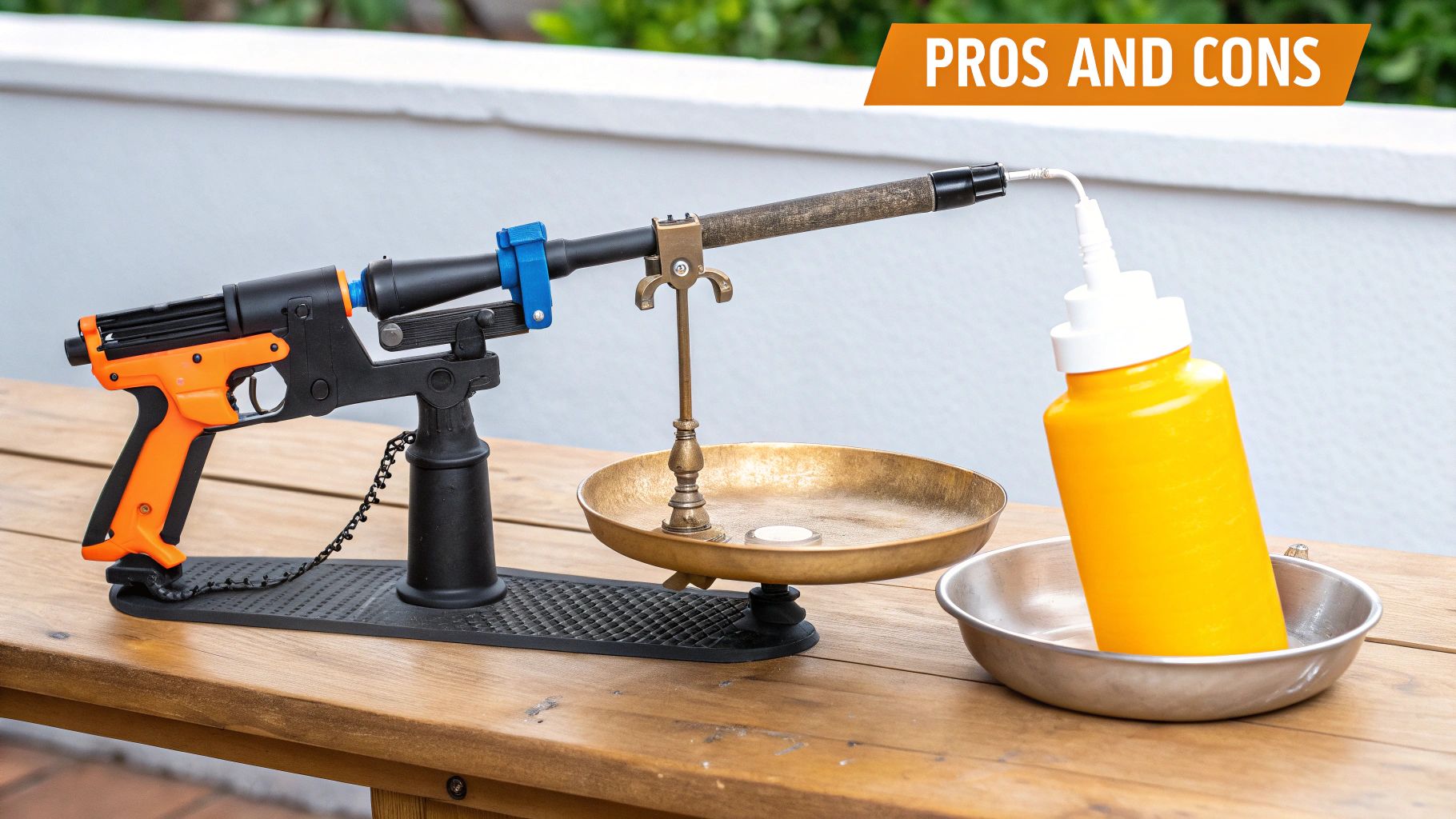If you're looking for the short answer, here it is: Grab a foam gun if you want a simple, budget-friendly step up from the old bucket-and-sponge method and you don't own a pressure washer. But, if you already have a pressure washer and are chasing that professional-level, ultra-thick foam for the safest possible wash, a foam cannon is the way to go.
Understanding the Core Differences
Choosing between a foam gun and a foam cannon really boils down to three things: what gear you already have, how much you want to spend, and the kind of results you're after. Both tools are fantastic for laying down a pre-wash layer of suds, but they're built for different users and situations.
The biggest distinction is the power source. A foam gun simply screws onto a standard garden hose. A foam cannon, on the other hand, needs the serious high-pressure water flow that only a pressure washer can provide.
This single difference changes everything—from the quality of the foam to how efficiently you can clean your car. A foam cannon creates that thick, shaving cream-like foam that you see professional detailers use. It's so dense because the high-pressure water violently mixes the soap, water, and air, creating a foam that clings to the paint. This extra dwell time gives the soap more time to break down and lift away dirt before you ever have to touch the surface.
A foam gun produces a much wetter, more liquidy foam. While it won't be as thick, it’s still incredibly effective at loosening light to moderate grime and is a massive improvement over just spraying your car with a hose. For most people doing a weekly wash, this is more than enough to get the job done right. The ultimate guide to choosing an auto foam gun for perfect car cleaning has even more on what makes these tools a crowd favorite.
Key Takeaway: The debate isn't about which tool is universally "better," but which one is better for your specific needs. A foam cannon delivers peak performance, while a foam gun is all about convenience and accessibility.
Quick Comparison Foam Gun vs Foam Cannon
To make the choice even clearer, this table breaks down the key differences at a glance. It's a great starting point for seeing which tool fits your car washing style.
| Feature | Foam Gun | Foam Cannon |
|---|---|---|
| Required Equipment | Standard Garden Hose | Pressure Washer |
| Foam Quality | Sudsy, Wet Foam | Thick, Clinging Foam |
| Initial Cost | Low | Moderate to High (includes pressure washer) |
| Ease of Use | Very High (Plug-and-play) | Moderate (Requires setup) |
| Best For | Beginners, Quick Washes, No Pressure Washer | Enthusiasts, Heavily Soiled Vehicles, Professionals |
Ultimately, this comparison shows there's a perfect tool for every car owner. Whether you prioritize the unmatched convenience of a foam gun or the professional-grade power of a foam cannon, you're making a great choice to improve your car wash routine.
How Each Foaming Technology Actually Works

To really get why these two tools produce such different results, you have to look at what's happening on the inside. It all boils down to two things: water pressure and how air gets mixed in. Let's pull back the curtain on how each one whips up its signature suds.
A foam gun is a marvel of simplicity. It hooks right up to a standard garden hose, which pushes out water at a pretty gentle 40 to 60 PSI (pounds per square inch). As that water flows through the gun, it creates a vacuum—a little something called the Venturi effect.
This suction is just strong enough to pull car wash soap from the canister and mix it into the water. The soapy water then gets a quick stir as it shoots through the nozzle, which adds some air to create foam. The result is a sudsy, but often runny, foam. It's a clever design that works with the gear most of us already have in our garage.
The Power of High-Pressure Agitation
A foam cannon, on the other hand, is a completely different animal. It’s built to harness the serious power of a pressure washer, which blasts water out at anywhere from 1,000 to over 3,000 PSI. This isn't just a small step up; it's a game-changer for foam creation.
Inside the cannon, that high-pressure water jet forces the soap and water solution through a special stainless steel mesh filter. This is where the magic really happens. The mesh screen violently churns the mixture, whipping an incredible amount of air into it. The result is that thick, shaving cream-style foam that professional detailers swear by. This dense foam sticks to the side of your car for a long time, giving the soap more time to break down dirt and grime.
The Critical Differentiator: The key is the foam cannon's internal mesh filter. Activated by the intense force of a pressure washer, this single component is what creates that thick, clinging foam. A foam gun simply doesn't have it, which is why its foam is always wetter and less dense.
The demand for that pro-level finish is booming. The foam cannon market was valued at around $500 million in 2025 and is expected to climb to nearly $800 million by 2033, thanks to the surge in DIY car care. This trend shows that more people want professional results at home, especially when tackling big jobs like trucks and RVs. You can dive deeper into these market trends in this detailed industry report.
A Head-to-Head Performance Comparison
Once you get past the initial setup, the real-world performance is where you'll see the night-and-day difference between a foam gun and a foam cannon. This isn't just about what looks cool—it's about the tangible results on your car's paint. Let’s break down how each tool performs across four key areas: foam quality, coverage speed, resource use, and how they feel in your hands during a wash.
Foam Quality and Dwell Time
The most obvious difference in the foam gun vs. foam cannon showdown is, without a doubt, the foam quality. A foam cannon produces a thick, rich foam that looks a lot like shaving cream and stubbornly clings to every surface. This happens because the high-pressure water forces the soap solution through a fine mesh screen, injecting a massive amount of air into the mixture.
That thick foam has a long dwell time, which is just a fancy way of saying it stays on your car longer. This gives the soap plenty of time to break down, soften, and lift stubborn dirt and road grime off the paint. This lubrication is the magic behind a safer, scratch-free pre-wash. On the other hand, a foam gun running off a simple garden hose creates a much wetter, sudsy solution that runs off the vehicle almost immediately. It's still helpful for light dust, but it just can't compete in terms of dwell time or deep-cleaning power.
Coverage Speed and Efficiency
Next up is coverage speed. This is where the foam cannon really shines. You can completely cover a standard sedan in less than a minute. The wide, powerful spray pattern lets you blast over large panels quickly, making it the undeniable champion for washing bigger vehicles like trucks, vans, or RVs.
A foam gun requires a more methodical approach. Its lower pressure and narrower spray mean you'll spend more time making sure every inch is covered. For smaller cars or for those who just enjoy the process and aren't in a hurry, it works just fine. But if you’re chasing pure speed and efficiency, the cannon leaves the gun in its dust.
The Performance Verdict: A foam cannon's superior foam quality and rapid coverage deliver a more professional and effective pre-wash. The clinging foam does the heavy lifting for you, pulling grime away from the paint before your wash mitt ever touches the surface.
The image below gives you a clear visual on the key performance differences that really separate these two tools.

As you can see, the pressure washer's power allows the cannon to generate that coveted thick foam and cover way more ground in the same amount of time.
To really see these differences side-by-side, let's look at the numbers.
Performance Metrics Head-to-Head
Here’s a detailed breakdown of how foam guns and foam cannons stack up against each other on the most important performance indicators.
| Performance Metric | Foam Gun Analysis | Foam Cannon Analysis | Winner |
|---|---|---|---|
| Foam Consistency | Produces a wet, sudsy foam. Runs off surfaces quickly. | Creates thick, shaving cream-like foam that clings to surfaces. | Foam Cannon |
| Dwell Time | Low. The foam's short contact time offers minimal cleaning power for heavy grime. | High. Extended contact time allows soap to break down and lift contaminants effectively. | Foam Cannon |
| Coverage Speed | Slower. Requires multiple passes to cover large panels. Best for smaller cars. | Very Fast. Can coat an entire vehicle in under 60 seconds. Ideal for large vehicles. | Foam Cannon |
| Water Usage | Low. Uses standard garden hose flow (3-5 GPM), conserving water. | High. Dependent on the pressure washer, typically using 1.2-2.5 GPM at higher pressure. | Foam Gun |
| Soap Efficiency | Moderate. Often requires more soap concentrate to produce a decent layer of suds. | High. Uses as little as 1-2 ounces of soap to generate thick foam for a full car. | Foam Cannon |
| Handling | Excellent. Lightweight, simple, and easy to maneuver. No learning curve. | Fair. Heavier and more cumbersome, attached to a pressure washer wand and hose. | Foam Gun |
Ultimately, the "winner" for each metric depends entirely on what you value most—sheer cleaning power or conservation and ease of use.
Resource Usage and Handling
When you look at water and soap consumption, the results are a bit of a mixed bag. You might think the powerful foam cannon is thirstier, but it's actually more efficient with soap. Because it does such a great job aerating the mixture, you only need 1-2 ounces of a good car wash soap to create that thick, effective foam. A foam gun usually needs more product to get a satisfying lather.
However, the foam gun is the clear winner in water conservation. It only uses the water coming from your garden hose. A pressure washer, by its very nature, uses more water per minute, even if the total wash time ends up being shorter.
Finally, let's talk about ease of use and handling. The foam gun is as simple as it gets—it's lightweight and feels just like any other hose nozzle. A foam cannon, attached to a pressure washer wand, is bulkier and can be a bit awkward to wield around your car, especially with a stiff hose trailing behind you. If you're looking for the absolute simplest, most straightforward experience, the foam gun has a real edge here.
To see how these performance differences play out with specific models, take a look at our guide to the 2025 top picks for perfect washes, where we review the best options on the market.
Breaking Down the True Cost and Equipment Needs

When you're thinking about upgrading your car wash routine, it’s easy to focus on the foaming tool itself. But the reality is, your total investment goes well beyond that initial price tag. A hard look at the complete equipment list for a foam gun versus a foam cannon shows a major gap in both cost and complexity. Getting this financial picture right from the start is key to avoiding surprises.
If you're looking for an easy and affordable entry point, the foam gun is hard to beat. Its biggest selling point is that it works with something you almost certainly already have: a standard garden hose. This simplicity means your only real expense is the foam gun, which is usually quite light on the wallet.
You don't need any other machines to buy, store, or worry about maintaining. You just screw it onto your hose, pour in some good car shampoo, and you’re good to go. It’s the definition of a low-barrier-to-entry setup.
The Foam Cannon and Its Essential Partner
The foam cannon, on the other hand, is a different beast entirely. Its impressive performance hinges on one critical, non-negotiable piece of equipment: a pressure washer. You simply can't use a foam cannon without one, and this is where the costs really start to add up.
The fundamental difference lies in how water gets to the tool. A foam gun is built for the low-pressure flow of a garden hose, which is what makes it so accessible. A foam cannon, however, requires the high-pressure stream from an electric or gas pressure washer to whip the soap and water into that thick, shaving-cream-like foam. While a foam gun offers convenience, a foam cannon delivers far superior foam density—but only if you have the right gear. You can get a deeper dive into this distinction in this helpful guide from Ethos Car Care.
And not just any pressure washer will do the job right. To get that rich, clinging foam you see in videos, you'll need a machine with enough muscle. Look for one that provides:
- A minimum of 1,100 PSI (pounds per square inch) to properly agitate the soap solution.
- At least 1.4 GPM (gallons per minute) to ensure there’s enough water flow.
Skimping on these specs will likely leave you with a disappointing, watery mess that slides right off your car, defeating the whole purpose of the cannon. Generally, electric models are quieter and easier to store, while gas-powered units bring more power to the table for tackling serious dirt.
The Full Investment: When you're pricing out a foam cannon, you have to think bigger. It's not just the cannon itself. You must budget for a compatible pressure washer and maybe even some different fittings to make sure it all connects properly. That $30-$70 cannon can quickly become a $200-$400+ total setup.
So, when you boil it down, the cost comparison is pretty clear. With a foam gun, you’re buying the tool and the soap. With a foam cannon, you’re buying the cannon, the soap, and a pressure washer, which is a significantly larger financial commitment from day one.
When to Choose a Foam Gun for Your Car Wash
While foam cannons get a lot of the glory for producing that super-thick, shaving-cream-like foam, the humble foam gun is often the smarter and more practical tool for a huge number of car enthusiasts. The choice isn't just about whether or not you own a pressure washer; it's about matching your car care routine to your budget, your living situation, and how you actually use your vehicle.
For many people, the foam gun is the absolute king of convenience. Think about it: if you live in an apartment, a condo with a shared garage, or a neighborhood with strict noise rules, firing up a loud pressure washer just isn't going to fly. A foam gun, on the other hand, runs silently off a standard garden hose, letting you give your car a thorough wash without becoming the neighborhood nuisance.
The Perfect Tool for Simplicity and Accessibility
Let's be honest, not every wash job requires the high-pressure assault of a foam cannon. If you're driving a smaller car like a compact sedan or a hatchback that just gets a light layer of dust and road film, a foam gun is more than enough. It lays down a perfectly effective layer of suds that loosens up the grime for a simple weekly wash—no need for overkill.
The sheer ease of use is another massive plus. You just screw the foam gun onto your hose, pour in your soap, and you're ready to go. There’s no heavy machine to drag out, no complicated nozzles to figure out. This makes it the ideal tool for a quick and painless clean when you're pressed for time.
Key Insight: A foam gun's greatest strength is its practicality. It’s the perfect entry point for someone new to detailing, giving you a taste of the foam wash experience without the steep investment in a full pressure washer setup.
This accessibility is a huge part of their appeal. In fact, foam guns account for about 40% of the global car wash foam system market, which is significantly larger than the 25% share held by foam cannons. Their universal compatibility with any garden hose makes them the default choice for the majority of home users. You can dig into these market dynamics in this industry report.
A foam gun is also incredibly forgiving. You don't have to stress about getting the soap-to-water mixture just right to get a good result. While our foam cannon soap ratio guide has tips that are useful for both, the foam gun is far less picky. If you value affordability, quiet operation, and straightforward simplicity, the foam gun is your clear winner.
When to Choose a Foam Cannon for Your Car Wash

While a foam gun is incredibly handy, there are times when you just need more firepower. This is where the foam cannon steps in. It's the go-to tool for serious enthusiasts and professional detailers who refuse to compromise on performance. Some jobs simply demand the raw power and thick, high-quality foam that only a pressure-washer-powered cannon can produce.
The decision to go with a foam cannon becomes crystal clear when you're after serious efficiency and cleaning muscle. The difference between a foam gun and a foam cannon is never more obvious than when you’re staring down a truly filthy vehicle. If your truck is caked in mud or your car is plastered with road grime after a long winter, a cannon isn't just a good idea—it's essential.
Power for the Toughest Jobs
What really sets a foam cannon apart is the foam itself. We're talking about a thick, shaving-cream-like consistency that tenaciously clings to the vehicle's surface. This extended dwell time is crucial, as it gives the soap the chance to get in there and break down stubborn contaminants that the wetter, runnier suds from a foam gun would just slide right off of.
This power is also a huge time-saver, especially with larger vehicles. Trying to wash an SUV, truck, or RV? A foam cannon blankets the entire surface in a thick, effective layer of soap in a fraction of the time. A few quick sweeps of the wand and you're done.
The Professional Standard: For anyone detailing multiple cars a week or simply demanding the absolute best pre-wash, a foam cannon is the industry benchmark. The investment pays for itself with superior, scratch-free results and significant time saved on every single wash.
At the end of the day, choosing a foam cannon is about prioritizing results. It’s the right call if you're dealing with:
- Heavily Soiled Vehicles: Its clinging foam is unmatched at breaking down mud, road salt, and baked-on grime that a foam gun just can't touch.
- Large Vehicles: The wide spray pattern and thick coverage make washing trucks, SUVs, and RVs fast and incredibly efficient.
- Detailing Enthusiasts: If you're committed to preserving your vehicle’s paint with the safest possible pre-wash, a foam cannon is an indispensable part of your arsenal.
If you fall into any of these camps, the initial cost of a foam cannon and a compatible pressure washer is an investment that will pay you back every time you wash your car, both in the quality of the finish and the time you get back in your day.
Here are some of the most common questions that pop up when you're deciding between a foam gun and a foam cannon. Getting these details right will make all the difference in your next car wash.
Can I Use Any Car Soap in a Foam Gun or Cannon?
Technically, you can use almost any car wash soap, but you absolutely won't get the thick, shaving-cream-like foam you're looking for. For the best results, you really need a shampoo specifically formulated for foaming.
These dedicated soaps are usually more concentrated and have the right viscosity to create a rich, dense foam that clings to your car's surface. That cling time is what allows the soap to break down and lift away dirt effectively. Stick with a true foaming soap, and you'll see a night-and-day difference in how either tool performs.
Does a Foam Gun or Cannon Replace a Hand Wash?
That's a common misconception, but no, neither a foam gun nor a foam cannon is a substitute for a good old-fashioned hand wash. Think of them as the perfect pre-wash stage.
Their job is to safely soften and lift the loose dirt, grit, and grime from the paint. After you rinse off that initial layer of foam, you've dramatically reduced the risk of scratching your paint during the contact wash. You'll still need your wash mitt and buckets to get rid of the more stubborn, bonded contaminants and achieve a truly spotless finish.
Pro Tip: Always flush your foam gun or cannon with clean water after you're done. Just fill the canister with plain water and spray it through for about 30 seconds. This quick step is crucial—it prevents soap scum from drying inside and clogging the delicate mesh filter, ensuring your tool works perfectly next time.
Ready to upgrade your car wash experience with unmatched convenience? The SwiftJet Car Wash Foam Gun connects to any standard garden hose and delivers thick, satisfying foam without needing a pressure washer. Get yours today at https://swiftjetusa.com.
